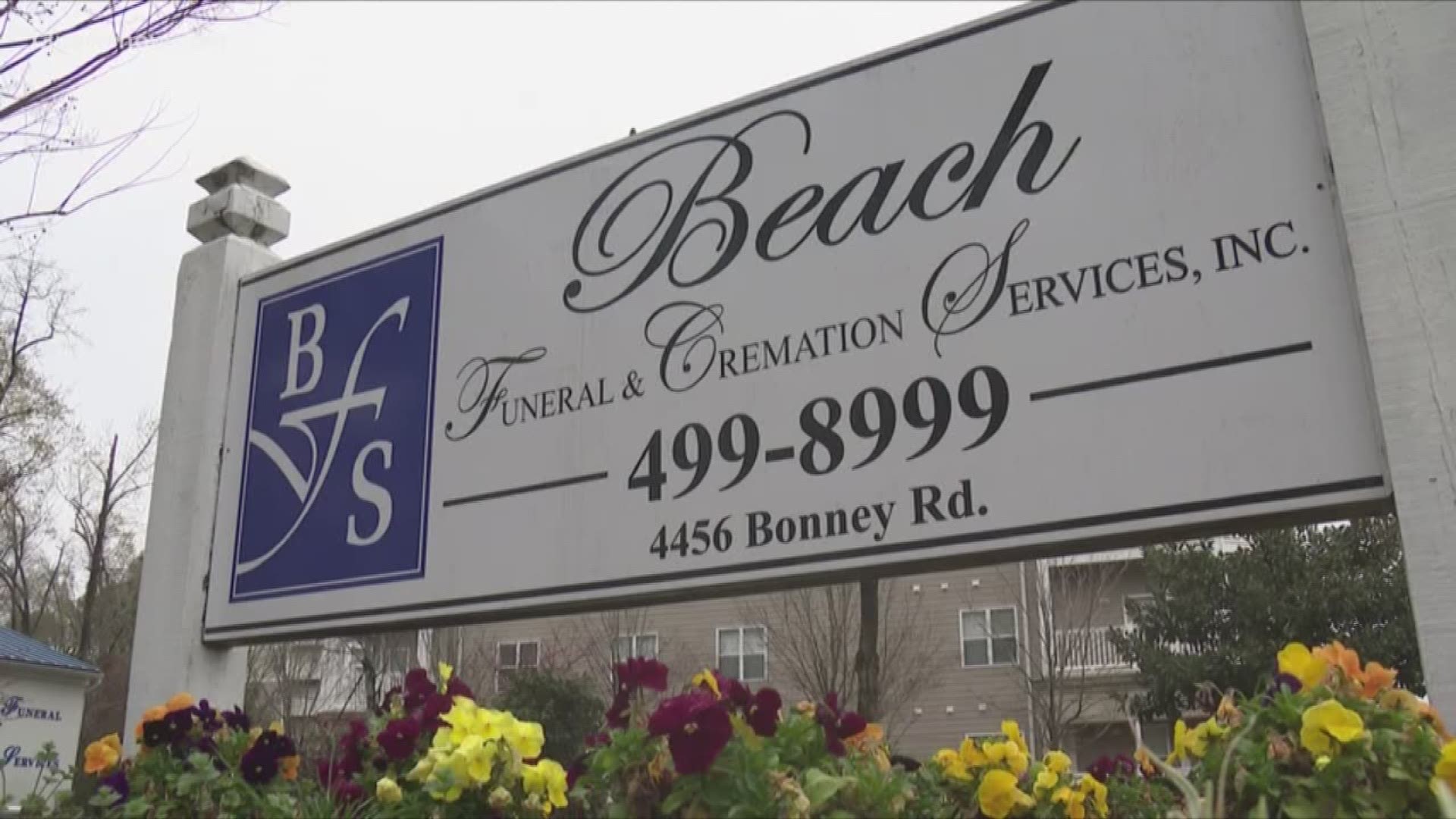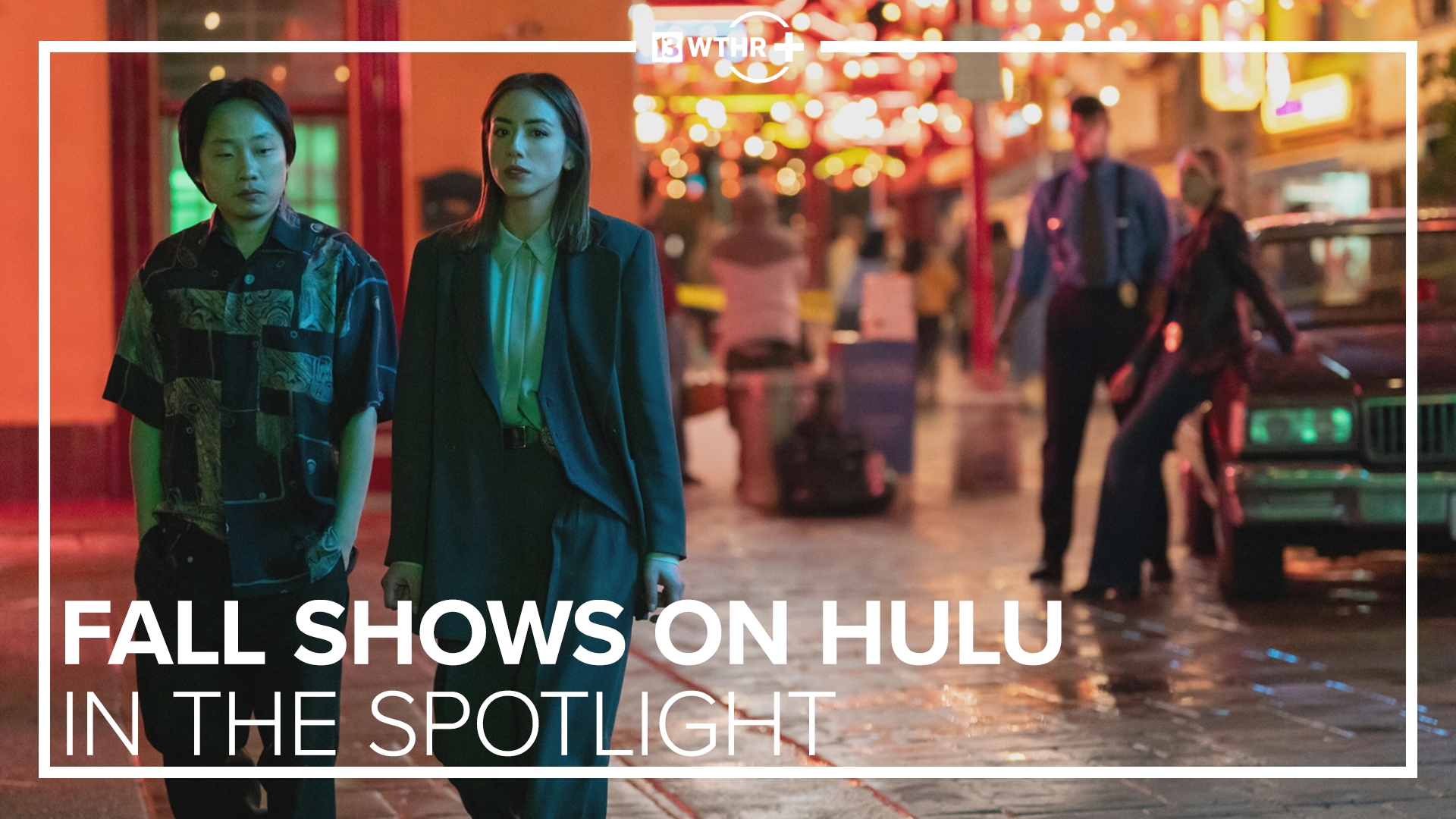ROANOKE, Va. — Nurses, doctors and emergency responders are the people most often identified as being on the front lines of the COVID-19 pandemic.
But Mike Hamlar, president of Hamlar-Curtis Funeral Home & Crematory in Roanoke, believes that list is incomplete.
"Funeral service professionals are first responders, too," he said.
The staff at Hamlar-Curtis comes into contact with people who died from COVID-19 and with their families, who may also be infected. It's a factor during the removal process and also when holding services.
"But we handle the person's loved one with care," he said. "And it's personal, you're up close and personal with these folks, with the decedents."
Naturally, Hamlar said, the funeral home's staff worries about their own health and safety.
"I honestly believe if you say you're not concerned, you're not being truthful with yourself," he said.
In the early days of the pandemic, Hamlar self-quarantined from his wife and kids. He said the hardest part was having to decline a hug from his 7-year-old son. He has since loosened his self-imposed restrictions but continues to take precautions — he showers at the office and changes his clothes before heading home. Still, he feels like they don't hug quite as much anymore. They favor the elbow bump these days.
The Virginia Funeral Directors Association is working to have its members formally recognized as essential health care workers by the state.
Lacy Whittaker, executive director of the association, said this designation is important to make sure funeral directors have the resources they need to protect themselves and their staff while supporting grieving families.
"Can you imagine what a hospital would look like if a funeral director wasn't standing at the back door to make removals?" Whittaker said.
A letter making the request was sent to Gov. Ralph Northam on Dec. 14.
"As deathcare professionals, we face the same risk of exposure to COVID-19 as healthcare workers when we enter hospitals, nursing homes, and residences to take the body of a decedent into our care," the letter states. "We meet with surviving family members who may have been exposed to the coronavirus. And we prepare the bodies of pandemic victims for burial or cremation."
Whittaker said she believes more support from the community, as well as recognition from the governor and legislators, would mean a lot to funeral directors.
"This industry, people may not realize, you see people, work with people, you worship with people, you're in the community with people, you see them one day and then the next day they're on your embalming table," Hamlar said.
That's always hard, he said, but especially so during a global pandemic.
Hamlar is doing some small things to help his employees cope with the added stress. On days without services, they can dress more casually. And Hamlar makes sure everyone is well-fed, often buying lunch for the staff.
People might think funeral homes benefit financially from COVID-19, Hamlar said, but that's a misconception. Many families are not holding services or are choosing cremation, which does have an impact on the business' bottom line.
Hamlar said he's frustrated by people who doubt the seriousness and severity of COVID-19. If they had to tell the parents of a 30-something that their child died because of it, or help them through their grief, they might feel differently.
NEW WAYS TO SHARE GRIEF
Chris Tharp, owner and manager of Tharp Funeral Home & Crematory, which has locations in the Roanoke Valley and Lynchburg area, said he feels his employees are most affected by the stories of loved ones who can't be at the side of a spouse or parent in their final weeks or months.
"Hearing their stories, watching them cry and the impact that has, we call it the proximity to grief," Tharp said.
Funeral directors are often thought of as stoic. But in reality, Tharp said, they are empathetic people who want to help others. With so many services delayed or dramatically scaled back, many of the people they serve can't truly begin to work through their grief. Tharp said that weighs heavily on funeral staff.
"They really can't have the celebration of life services and remembrance services or visitation with friends services that have been in human tradition for millennia," he said.
There's a phrase Tharp said is taught in mortuary school: "Grief shared is grief diminished." Coming together as a church, community or family to tell stories and share memories is essential to the process.
On a recent trip to the grocery store, Tharp ran into a client whose father had died about a month ago. She told Tharp it felt as if her dad "just disappeared" because the family had not held a service for him.
"From our staff's perspective, it just wears them down because we can't provide them the usual mechanisms for healing," Tharp said.
In terms of support for employees, Tharp said everyone is trying to be patient and recognize that people are concerned not just about their own health, but that of loved ones as well. There's also "lots of elbow bumps."
"The biggest thing we're doing is just validating the concern and not pretending it's not something to take seriously," Tharp said.
At times, Tharp said, the funeral home has been short-staffed when its own employees have been personally affected by COVID, putting more pressure and stress on those covering for a colleague.
EXTRA PRECAUTIONS
Buck Simmons, owner of Valley Funeral Home and Cremation Service in Roanoke, said it's hard to tell grieving families they have to significantly limit the number of guests who can attend a service.
"They're already going through emotions with the death of their loved one, and now they've got to deal with this COVID," he said.
Funeral home staff always have to be careful when handling bodies to protect their own health, Simmons said. Now COVID-19 is another thing to worry about.
When discussing funeral services, tears are common. That means people in the building are wiping their eyes and their noses, Simmons said. Additional sanitation is required as a result.
In general, Simmons said his business does more cremations than traditional funerals; he estimated the former make up about 75% of his business. He said the pandemic may prompt some people to choose cremation, given the limitations on in-person services.
Keeping spirits high is always a challenge, Simmons said. But relief comes by helping others through their grief.
"You've got to realize that every day we come to work, somebody's either sad or crying," he said. "In order to keep ourselves where we don't emotionally get torn down, it's to give the families the best service we can give them, regardless of what type of service they are getting from us."
A 'GLIMMER OF HOPE'
The last nine months have been anxious ones for the employees of Roanoke-based Oakey's, said President Sammy Oakey.
"We talk about it. I think that helps," he said. "We don't try to hide it."
He said the funeral home has been strict with staff and guests about masks, social distancing and not coming in when feeling sick. But still, there's risk.
"We know that we could easily have a case that comes in through our preparation room on a body, or we could have a case come in through the front door with somebody attending a visitation or a funeral or simply coming in to make arrangements," Oakey said.
Oakey's makes professional counseling available to its employees through a Carilion Clinic program, Oakey said, although he hasn't noticed an increase in the number of people who have used the service.
The "minor skirmishes" employees continue to have with people who don't want to wear a mask or who wear them improperly are another stressor. Recently, Oakey said, someone who had tested positive wanted to come into the funeral home for a service, a request that of course had to be denied.
Grieving is never easy, Oakey said, but it's especially challenging with COVID-19, which can come on suddenly and often isolates its victims from loved ones.
"That is really tough to see. Our hearts go out to anyone who loses a loved one, but when you lose a loved one to such a thing as COVID where you can't be close to them and where you know that their last days were very difficult, it's a little unnerving for us," he said. "We try to give everybody extra TLC that has gone through that."
The public may not be aware of the toll the pandemic has taken on those who work in the funeral industry. The attention — "rightfully so," Oakey said — has been centered on doctors, nurses and EMTs. But he said the funeral industry should not be forgotten.
The vaccine has provided a "glimmer of hope," Oakey said. He received notice from the National Funeral Directors Association that it had successfully lobbied to have funeral directors included in the highest priority group for the vaccine.
Oakey said he's never worked under such conditions before. He remembers hearing that his great-grandfather went months without a day off during the 1918 flu pandemic. Now that he's living through something similar, Oakey said he wished he'd paid closer attention to those stories.




